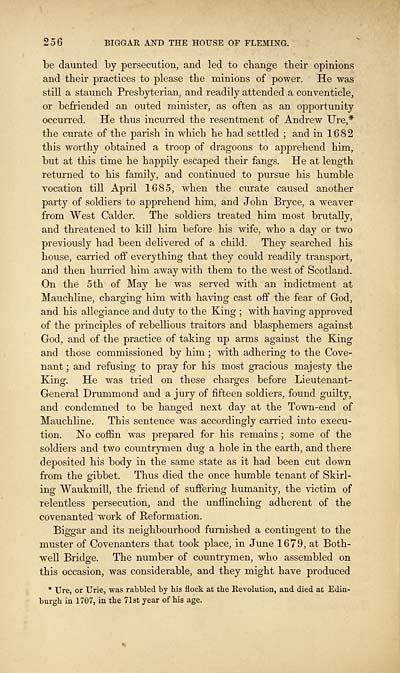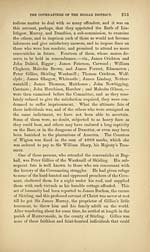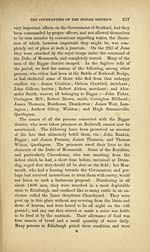Biggar and the House of Fleming
(284) Page 266
Download files
Complete book:
Individual page:
Thumbnail gallery: Grid view | List view

256 BIGGAR AND THE HOUSE OF FLEMING.
be daunted by persecution, and led to change their opinions
and their practices to please the minions of power. He was
still a staunch Presbyterian, and readily attended a conventicle,
or befriended an outed minister, as often as an opportunity
occurred. He thus incurred the resentment of Andrew Ure,*
the curate of the parish in which he had settled ; and in 1682
this worthy obtained a troop of dragoons to apprehend him,
but at this time he happily escaped their fangs. He at length
returned to his family, and continued to pursue his humble
vocation till April 1685, when the curate caused another
party of soldiers to apprehend him, and John Bryce, a weaver
from West Calder. The soldiers treated him most brutally,
and threatened to kill him before his wife, who a day or two
previously had been delivered of a child. They searched his
house, carried off everything that they could readily transport,
and then hurried him away with them to the west of Scotland.
On the 5 th of May he was served with an indictment at
Mauchline, charging him with having cast off the fear of God,
and his allegiance and duty to the King ; with having approved
of the principles of rebellious traitors and blasphemers against
God, and of the practice of taking up arms against the King
and those commissioned by him ; with adhering to the Cove-
nant ; and refusing to pray for his most gracious majesty the
King. He was tried on these charges before Lieutenant-
General Drummond and a jury of fifteen soldiers, found guilty,
and condemned to be hanged next day at the Town-end of
Mauchline. This sentence was accordingly carried into execu-
tion. No coffin was prepared for his remains ; some of the
soldiers and two countrymen dug a hole in the earth, and there
deposited his body in the same state as it had been cut down
from the gibbet. Thus died the once humble tenant of Skirl-
ing Waukmill, the friend of suffering humanity, the victim of
relentless persecution, and the unflinching adherent of the
covenanted work of Keformation.
Biggar and its neighbourhood furnished a contingent to the
muster of Covenanters that took place, in June 1679, at Both-
well Bridge. The number of countrymen, who assembled on
this occasion, was considerable, and they might have produced
* Ure, or Urie, was rabbled by his flock at the Revolution, and died at Edin-
burgh in 1707, in the 71st year of his age.
be daunted by persecution, and led to change their opinions
and their practices to please the minions of power. He was
still a staunch Presbyterian, and readily attended a conventicle,
or befriended an outed minister, as often as an opportunity
occurred. He thus incurred the resentment of Andrew Ure,*
the curate of the parish in which he had settled ; and in 1682
this worthy obtained a troop of dragoons to apprehend him,
but at this time he happily escaped their fangs. He at length
returned to his family, and continued to pursue his humble
vocation till April 1685, when the curate caused another
party of soldiers to apprehend him, and John Bryce, a weaver
from West Calder. The soldiers treated him most brutally,
and threatened to kill him before his wife, who a day or two
previously had been delivered of a child. They searched his
house, carried off everything that they could readily transport,
and then hurried him away with them to the west of Scotland.
On the 5 th of May he was served with an indictment at
Mauchline, charging him with having cast off the fear of God,
and his allegiance and duty to the King ; with having approved
of the principles of rebellious traitors and blasphemers against
God, and of the practice of taking up arms against the King
and those commissioned by him ; with adhering to the Cove-
nant ; and refusing to pray for his most gracious majesty the
King. He was tried on these charges before Lieutenant-
General Drummond and a jury of fifteen soldiers, found guilty,
and condemned to be hanged next day at the Town-end of
Mauchline. This sentence was accordingly carried into execu-
tion. No coffin was prepared for his remains ; some of the
soldiers and two countrymen dug a hole in the earth, and there
deposited his body in the same state as it had been cut down
from the gibbet. Thus died the once humble tenant of Skirl-
ing Waukmill, the friend of suffering humanity, the victim of
relentless persecution, and the unflinching adherent of the
covenanted work of Keformation.
Biggar and its neighbourhood furnished a contingent to the
muster of Covenanters that took place, in June 1679, at Both-
well Bridge. The number of countrymen, who assembled on
this occasion, was considerable, and they might have produced
* Ure, or Urie, was rabbled by his flock at the Revolution, and died at Edin-
burgh in 1707, in the 71st year of his age.
Set display mode to:
![]() Universal Viewer |
Universal Viewer | ![]() Mirador |
Large image | Transcription
Mirador |
Large image | Transcription
Images and transcriptions on this page, including medium image downloads, may be used under the Creative Commons Attribution 4.0 International Licence unless otherwise stated. ![]()
| Histories of Scottish families > Biggar and the House of Fleming > (284) Page 266 |
|---|
| Permanent URL | https://digital.nls.uk/94842690 |
|---|
| Description | A selection of almost 400 printed items relating to the history of Scottish families, mostly dating from the 19th and early 20th centuries. Includes memoirs, genealogies and clan histories, with a few produced by emigrant families. The earliest family history goes back to AD 916. |
|---|

